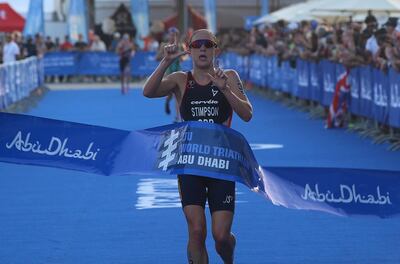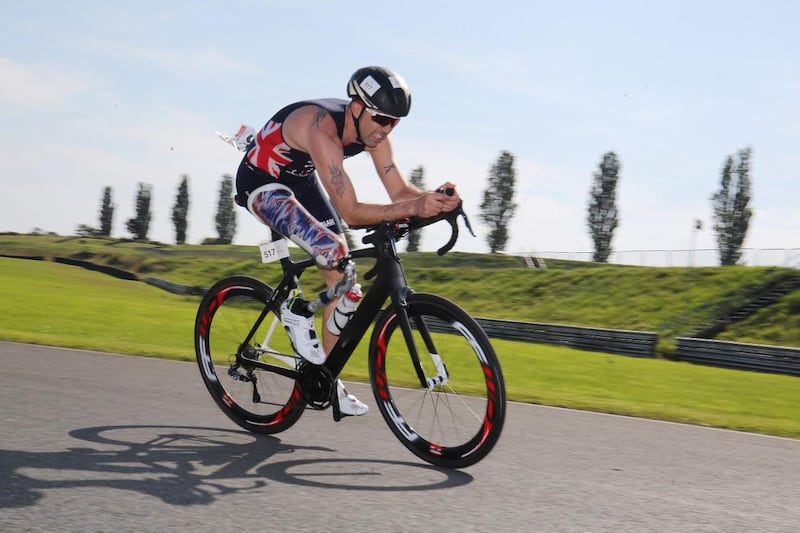British para-triathlete Andy Lewis has won all the major competitions dating back to April 2016.
His winning streak of eight major titles began at Penrith ITU World Paratriathlon, with his most recent success coming at the Sarasota ITU Paratriathlon World Cup in October 2017.
Lewis, who arrives for the ITU World Triathlon Abu Dhabi in March as an overwhelming favourite, spoke to Amith Passela about his run of successes among other things. Here are excerpts from the interview.
Q: Will March be your first visit to Abu Dhabi? If so, how are you looking forward to the event?
A: Yes, it will. I am really excited to be coming to Abu Dhabi. It seems a beautiful country and I am really excited about the race, more excited than any other race on my calendar this year.
Q: The weather in March can be a lot hotter than any other places you may have raced. Have you taken that into consideration while preparing?
A: As this is my first race of the season I will be using it as a warm-up event. It seems quite fitting when the temperature is normally 24C-29C during the month of March.
I am normally pretty good in the heat. I actually perform quite well. On this occasion I won’t be doing any heat prep, but I will be spending most of January and February out of the UK in a winter training camp in Lanzarote [off the coast of West Africa].

Q: Have you done any research on Abu Dhabi, like talking to someone who has taken part previously or trainers in your team, about the weather and so on?
A: No I haven't yet, due to Christmas, etc. Most of the athletes in our team have been in holiday. I have recently sent a message to [fellow British triathlete] Jodie Stimpson asking for any tips or hints.
I will be travelling without my fellow teammates and coaches, so any help I can get beforehand would be good.
Q: Have you already started preparing for Abu Dhabi? If so, can you describe your training schedule (how many days per week, how many hours per day, what your usual day looks like).
A: I have just started training after the Christmas break. I haven't been doing too much, mainly just ticking over on the bike and a few runs.
I found a new love for mountain biking so spent most of my time riding my new specialised mountain bike. My usual training week consists of an average 26 hours a week. This normally consists of four bikes [rides] a week, three runs, two gym sessions, swimming every day.
Q: Did you have a break after your last race in 2017? If so, how long and when did you start training again?
A: I spent a week in the USA after Sarasota [in Florida], visiting Nasa, Universal studios, etc, and then returned to the UK to take my family abroad to Spain for a well-deserved break.
I travel around quite a lot and never get chance to take my wife or children, so any opportunity I get is well worth it. My wife will be travelling with me to Abu Dhabi, so it’s a rare opportunity for us to spend some time together with our children.
Well Done everyone involved in making this happen on home soil. Very excited to see @Arctic_0NE, @BritTri & @worldtriathlon coming together & making this happen. #TogetherStronger we can get more people involved in the sport we love so much. #excited https://t.co/gYSiB2j14Y
— Andy Lewis MBE (@Bladerunnerandy) January 16, 2018
Q: You have been on a roll, winning eight races on the trot, starting from Penrith in April 2016 to your last race Sarasota. How confident are you taking that forward in Abu Dhabi?
A: I have been looking forward to get racing again, and I am sure if I continue where I left off last year I can take the win. I am up against Mohamed [Lahna of Morocco who won bronze in the PT2 Class Paralympics in Rio] who's an amazing athlete. However, it's an early start for us both so will be fun.
Q: Was winning the Paralympic gold at Rio your biggest career triumph. If so, could you describe that feeling? Or do you have any other memorable experiences ahead of that. If yes, could you describe that, too?
A: Winning in Rio for sure made me realise my potential, not just in sport but also in life. It made me feel very proud of my achievements. It has raised my profile in the sport somewhat but it hasn't made a massive difference to my dream, aspirations and goals.
It has made me realise that motivating people, especially children, is something that I really enjoy. I have started a business where I now mentor children all over the country at home, gym, or school it’s important to me.
Q: What plans do you have for 2018?
A: I am away training for two months in Lanzarote, and then will be racing every month from UK across the world to Australia. I have 10 races planned. I am, though, planning on chilling a little this year and not to concerned with the results of my races apart from the World Champs where I will be going whole heartily into this race for the win and nothing else.
Q: How supportive is your family? Can you give us a brief account of how you spend time with your young family? What do you like to do during your free time? Do you have hobbies etc?
A: I currently don't have any hobbies. Triathlon is my life, which a little bit sad to be honest, but I don't really have any other hobbies apart from watching Netflix. I do like a good series and use it as recovery after my sessions.
I love spending time with my children and the occasionally evening away with my wife. My family, and not just my wife, have been key members of my team. My mother and grandparents, for example, look after my children at times when my wife has to work and I have to train.
Q: You had your leg amputated at 22. At that time did you think a career as an athlete was possible?
A: No not at all, I didn't know what path my life was going to take. I really thought I was going to be in the military, so that was my life. I had nothing else planned. I suppose the thing that led me towards being an athlete was the fact that people told me it wasn't possible for me to be an athlete, let alone make my way to Rio.
I want to spend the day with @petosagan #Legend so he can teach me how to wheelie, I want to be the first amputee stunt rider, if he can do one legged wheelies it shouldn’t matter that I have one leg 👌come on ##BORAhansgrohe let’s make it happen 👏 pic.twitter.com/rX9JKbQXSB
— Andy Lewis MBE (@Bladerunnerandy) January 12, 2018
Q: How did you your career as a para athlete come about?
A: I was trying my hand at athletics. However, getting my running blade didn't just happen overnight. It was a long drawn-out process. I had to raise thousands of pounds to get the blade intact, nearly £10,000 [Dh50,611], as its not paid for by our [government-run] National Health Service.
I put on lots of events to raise the funds, and once I had the funds I wanted to show people that it was not a waste of money, and I could make something of it. I went on to join a couple of events and was noticed at an event by a charity called the Arctic One Foundation, who I now an ambassador for.
They help disabled people get active by putting on events. In fact one of the key charity members, Bex Stubbings, will be in Abu Dhabi with me as part of her role with the ITU as an official.






